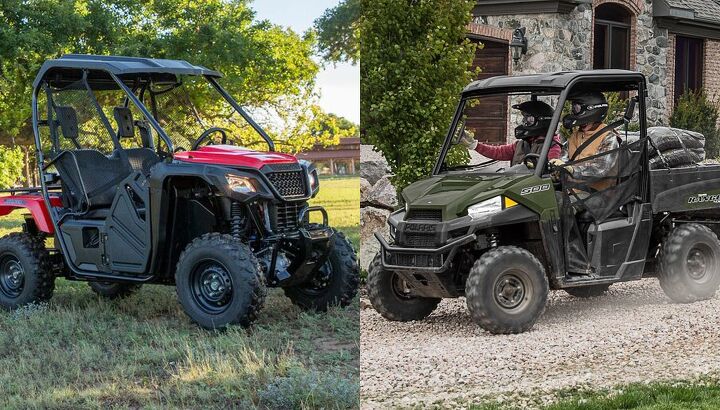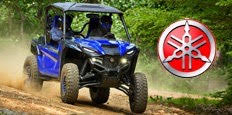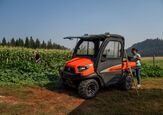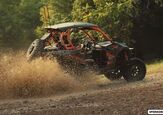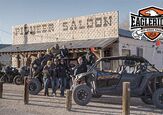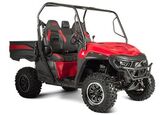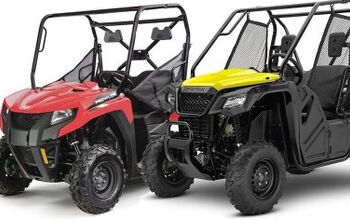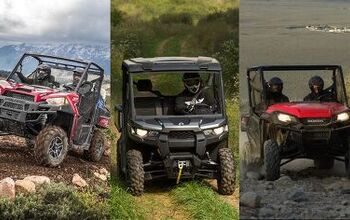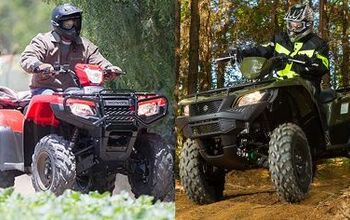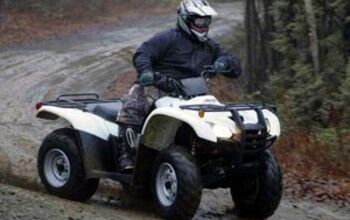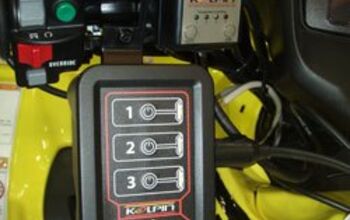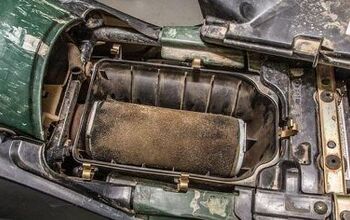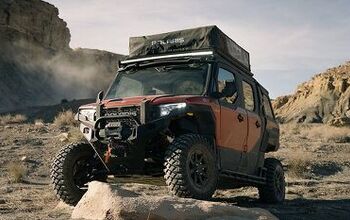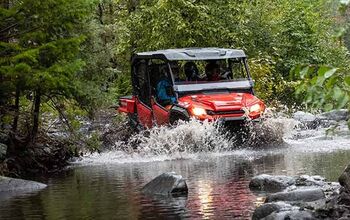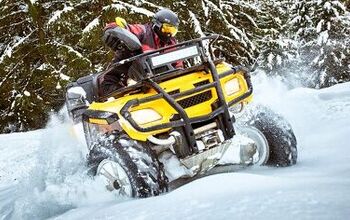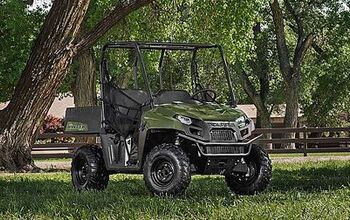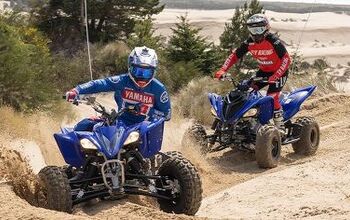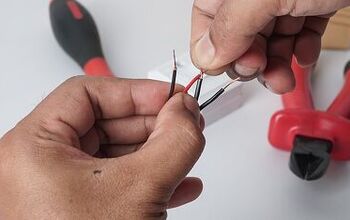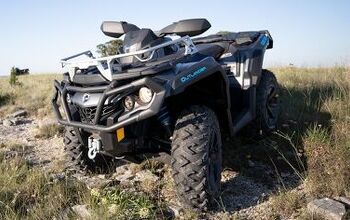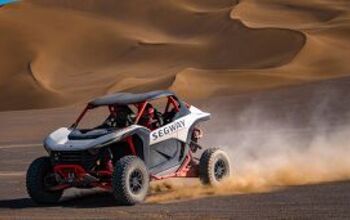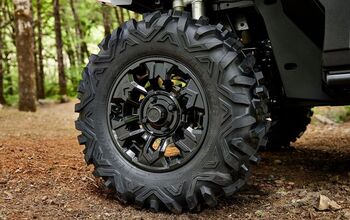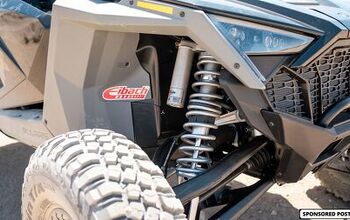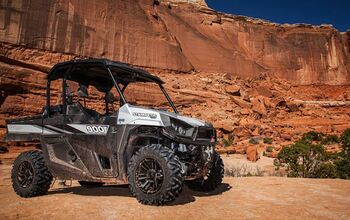2017 Polaris Ranger 500 vs Honda Pioneer 500: By the Numbers
While there are plenty of big horsepower UTVs on the market with big price tags to go along with them, not everyone has the budget or the need for the biggest UTV they can get. There is a definite niche market for the entry-level utility/recreation Side-by-Side that has enough power to do moderate work and play, and that can fit into most budgets. Two of the “heavyweights” in the division are the 2017 Polaris Ranger 500 and the Honda Pioneer 500, each with an MSRP of $8,999. Let’s break them down by the numbers.
| 2017 Polaris Ranger 500 | 2017 Honda Pioneer 500 | |
| Price | $8,999 | $8,999 |
| Engine | 500cc Single Cylinder Four-stroke ProStar | 475cc liquid-cooled, single cylinder four-stroke |
| Horsepower | 32 | 29 |
| Driveline/Differential | On-Demand True AWD/2WD/ VersaTrac Turf Mode | Direct front and rear driveshafts |
| Transmission | Automatic PVT H/L/N/R/P; Shaft | Five-speed automatic with AT/MT modes w/paddle shifting and reverse |
| Wheelbase | 73 in | 73 in |
| Overall Dimensions (LxWxH) | 110 x 58 x 73 in | 102.6 x 50 x 71.3 in |
| Weight | 1,065 lbs (dry weight) | 1,025 lbs (curb weight) |
| Front Tires | 25 x 8-12; 489 PXT | 24 x 8-12 |
| Rear Tires | 25×10-12 ; 489 PXT | 24 x 10-12 |
| Ground Clearance | 10.0 in | 8.5 in |
| Fuel Capacity | 9.0 gal | 4.1 gal |
| Front Suspension | MacPherson Strut 9 in | Independent double-wishbone; 5.9 in |
| Rear Suspension | Dual A-Arm, IRS 10 in | Independent double-wishbone with preload adj; 5.9 in |
| Front /Rear Brakes | 4-Wheel Hydraulic Disc | Dual 200mm hydraulic disc/170mm hydraulic disc |
| Bed/Rack Capacity | 1,000 lbs | 450 lbs |
| Towing Capacity | 1,500 lbs | 1,000 lbs |
A couple years ago, Polaris introduced the Ace, and along with it, a 335cc ProStar engine that became the platform for not only the first Ace, but the ETX Ranger and Sportsman models. These were the entry-level machines with decent horsepower and a nice price point. For 2017, Polaris was able to bump up the engine size to a full 500cc, boosting power and making the lineup more attractive to the consumer, all while keeping the price nice as well. The Ranger 500 has the 500cc, single cylinder ProStar engine that produces a pleasing 32 horsepower.
Honda’s Pioneer 500 has a 475cc single-cylinder four-stroke engine that comes complete with an automatic clutch and two drive modes, letting you run in automatic mode, or a manual shift mode with paddle shifters. The Pioneer offers up a sporty ride that is enhanced by banging through the gears with the paddles. While the Honda comes in with around 29 horsepower, it makes up for it with a good power-to-weight ratio.
The Ranger is, well, a typical mid-size Ranger. It is slightly narrower than the full-sized model at 58-inches in width. It has seating for two with sculpted bench seats. The big news is the fully dumping cargo box with 1,000 pounds ofcapacity and 1,500 pounds of towing capacity. Having an entry-level machine with capabilities close to that of the flagship model is quite astounding.
The Pioneer is a different kind of animal. It comes in at a skinny 50-inch width, making it legal for most any ORV trail. This also means that the Pioneer 500 will fit into the bed of most full-sized pickup trucks. Unlike most other UTVs, the smallest Pioneer doesn’t have a traditional cargo box. Instead, it comes with a rear steel rack, much like an ATV. The rack holds up to 450 pounds of gear, making it capable for work and play. It can also tow up to 1,000 pounds.
Aside from the price point and both being 500-class UTVs, there isn’t much that is similar between the Polaris Ranger 500 and the Honda Pioneer 500. They are very different paths to a similar spot in the market. Does that make one better than the other? Not at all. It’s part of what makes this such a great sport. So many different options to choose from. In the end, you are the one who has to decide what you want from your UTV.
Derrek's love for all things ATV started when he was a mere 11 years old, growing up on his family farm. His mom gave him and his sister a choice - get a horse, or a three-wheeler. The sister wanted the horse, and Derrek wanted the ATV. Luckily he won out, and was soon burning up the trails on a Yamaha Tri-Moto 200. By the time he was 14, he had saved enough of his own money by working on the farm and in his folks restaurant to buy a new 4-wheeler. That happened the day he and his mom were driving past the dealership and saw 1987 Banshee. His mom had no idea what he was buying, and he never looked back. He's been riding ever since, and been writing professionally for many years. He has ridden all over North America and been behind the controls of just about every machine out there. And yes, he still has his 1987 Yamaha Banshee.
More by Derrek Sigler



